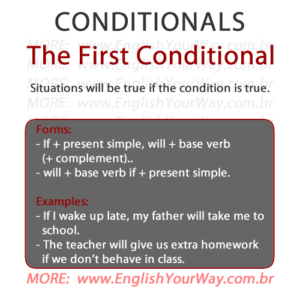 The first conditional has the present simple after ‘if’, then the future simple in the other clause:
The first conditional has the present simple after ‘if’, then the future simple in the other clause:
if + present simple, will + base verb…
Will + base verb if present simple.
The First Conditional is a REAL and is used to talk about things which might happen in the future.
- If Sally is late again I will be mad.
- If it rains, I won’t go to the park.
- I will be mad if Sally is late again.
- If I have enough money, I‘ll buy some new shoes.
- She‘ll be late if the train is delayed.
- If I study today, I‘ll go to the party tonight.
- If I see her, I‘ll tell her.
- If it rains, you will get wet.
- You will get wet if it rains.
- If you don’t hurry, you will miss the bus..
First vs. Zero Conditional:
The first conditional describes a specific situation, and the zero conditional describes what happens in general.
For example (zero conditional):
If it rains, the grass gets wet.
This is a general fact. It’s always true.
But (first conditional):
If it rains tomorrow, I’ll need my umbrella.
This refers to a specific situation (tomorrow) not a general fact.
or more about the Zero Conditional, see the Zero Conditional Page
